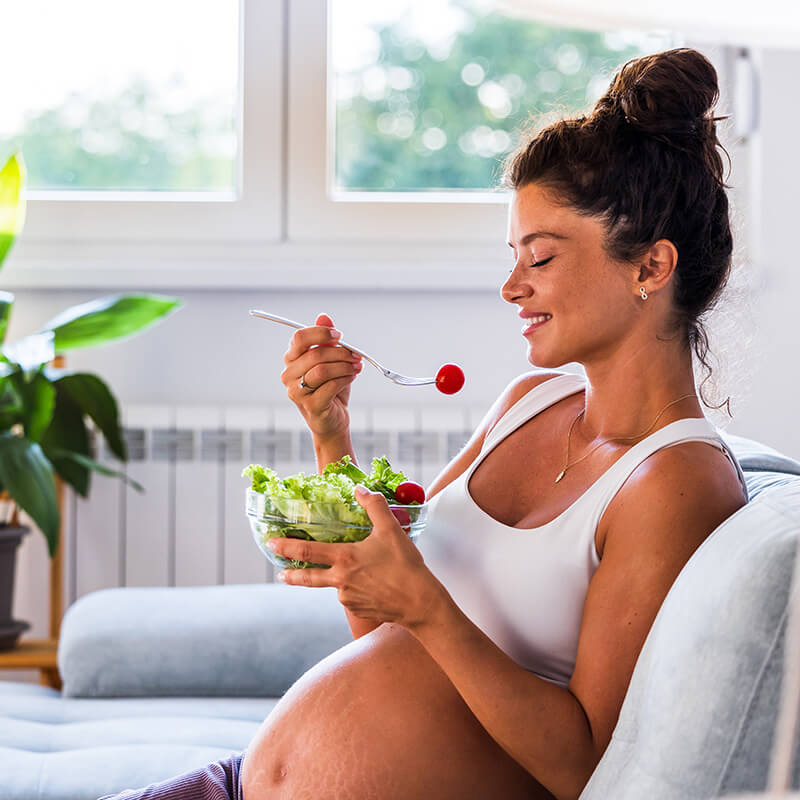

As you prepare for pregnancy, your chances can improve if you maintain a normal body weight. Being overweight or underweight can have a negative impact on your chances for pregnancy. If you have trouble maintaining a normal weight, the problem may persist due to a condition called polycystic ovary syndrome (PCOS). If this is your diagnosis, Inovi fertility specialists and nutritionists will work with you to evaluate your body’s needs and recommend dietary changes that can lower your BMI, helping increase your chances of fertility. They will coordinate an overall wellness plan to monitor and maintain a healthy preconception body weight profile.

As you prepare for pregnancy, your chances can improve if you maintain a normal body weight
In addition to weight maintenance, your diet can affect your egg quality. Egg quality becomes critical as we age, and making the right food choices and including exercise into your routine can facilitate healthy egg development. If you are past 30 and just now considering pregnancy it’s not too late to start a new healthy lifestyle that includes the right diet.
Recommendations for improving your egg quality can include:
What to Eat When Trying to Get Pregnant
Have you considered how your diet may affect your ability to get pregnant? Many recent studies have focused on which foods help prepare your body for pregnancy. It may be surprising to learn that dietary changes aren’t just important for the female partner. Antioxidants for the male partner are now encouraged and appear to benefit and increase your chances for fertility.
Basic foods and supplements below can help keep you and your partner’s body in shape for conception.
Folic acid remains important
Your folic acid intake prior to and during pregnancy is critical. It aids in preventing neural tube defects (NTDs), which can lead to Spina Bifida and anencephaly, the most commonly caused impairments caused by folic acid deficiency.
By taking the recommended supplemental folic acid you may increase your chances of ovulation. Additionally, there is evidence that folic acid plays a role in higher egg (oocyte) production in women.
If you are considering additional fertility treatment options, folic acid has also been shown to increase your chances of reproductive success with Assisted Reproductive Technologies.
Vitamin D supplements
Vitamin D is beneficial to all female patients trying to conceive and is recommended. Our fertility team headed by Dr. Stephan Krotz will assess your current metabolic profile to determine the right fertility diet and supplement regime to help you achieve your pregnancy goals.
Antioxidants for men appear important
Surprisingly, no real evidence exists that taking antioxidants increase fertility in women. However when the male partner’s diet includes additional antioxidant intake the couple’s chances of fertility show an increase.
Tell Us How We Can Help You Fulfill Your Dream Of A Family!
Sign up to attend an informational session in our office to learn more about our great success rates and other families along the journey.
What Foods Increase Fertility Chances?

Mediterranean style diets
There is evidence that a diet of fish, poultry, fruits and vegetables supplemented with whole grains can increase the chances of fertility in women and better quality semen in men.
Keeping your blood sugar at normal levels without drastic swings is important, especially since high insulin is associated with abnormal hormone levels found in PCOS patients.
Need a boost in the right direction? Our wellness program offers group classes , individual counseling and wellness podcasts. Having a fertility tracker is also a good way to keep up with your progress.
Alcohol and caffeine
Limiting coffee intake to one cup per day for women may be a good idea. Some studies have shown that 200 mg of coffee may increase your risk for miscarriage. We recommend limiting alcohol or caffeine since there can be a negative impact on your fertility.
We have trained dietitians discuss and provide dietary alternatives to boost your energy, mood and stamina when replacing certain foods and beverages. We also have behavioral coaches to help you make changes to your lifestyle that could make the difference in your pregnancy outcomes.
Dairy and soy
Although dairy and soy have not found favor with many fertility specialists and have been on lists as substances to avoid, the jury is still out in this area. Since you may have other conditions that require avoiding these foods, we will work with you to determine your ideal diet intake. Inovi nutritionists and wellness coaches review your current labs, diagnosis and treatment recommendations to develop your exact fertility roadmap.
Additional Information About Health and Fertility

Does Exercise Increase Fertility?
Too much stress can produce high hormone levels such as prolactin and cortisol, making it more difficult to ovulate and conceive. You can help lower these with basic exercise, yoga and stress reduction programs in addition to fertility medication protocols.
In addition to diet changes, a balanced approach to exercise can be beneficial not only for weight maintenance, blood circulation, and blood sugar levels but also to help lower your stress level. At Inovi our wellness program includes weekly counseling sessions, yoga and massage classes.
Lifestyle Factors that Can Affect Your Fertility Chances
There are certain behaviors and choices you can make to promote pregnancy. More evidence shows by adding or removing just a few habits or possibly opting for a change of environment you could improve your chances for a new fresh start. These are among the ones to consider and discuss with your fertility specialist team:
- Environmental exposures impact for both male and female partners
- Medical assessment of current fertility status to offset major obstacles in future
- Appropriate contraception
- Clothing that could affect sperm
- Lubricant choices
- Smoking elimination
- Alcohol
At Inovi we take your pregnancy seriously, and we are glad to walk through this journey with you.
Let us help you take your next step on the path to pregnancy. Schedule your appointment today at 713-401-9000.
